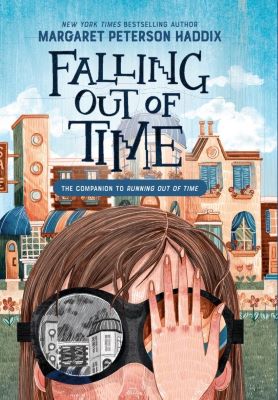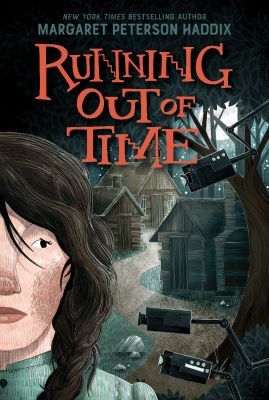Falling Out of Time: Frequently Asked Questions
Note: My answers may contain some spoilers for the book—please don’t read this if you haven’t finished the book!
Why did you wait so long after Running Out of Time came out before writing Falling Out of Time?
Running Out of Time was my very first published book, and at that point, I was just amazed that I'd managed to write and publish one book--the thought of writing a sequel seemed insurmountable! I also didn't have any ideas for continuing the story in a way that was equally exciting and adventure-filled, and didn't feel like it would ruin what everyone thought of Running Out of Time. I could think of entirely too many movie sequels I'd seen that made me think less of the original movie, and I didn't want to do that to Jessie and her story.
So I moved on to writing other stand-alone books about other characters and other settings. And then I started writing series based on other books of mine, but it still felt impossible to write a sequel to Running. Still, readers kept asking me for a sequel, so I did keep going back to the question, "How could I continue Jessie's story in a way that does the original story justice?" Readers also kindly made suggestions of their own, and some of their suggestions were absolutely brilliant, but not what I wanted to write.
And then some of the suggestions that readers made got me to thinking about a possible follow-up in a completely different way. In the midst of the Covid pandemic, when I wasn't traveling constantly, I thought about those new ideas even more, and I got excited about them--and then I started writing.
It ended up being 28 years between the publication of Running and Falling. You don't have to know much about publishing to understand that's not an ideal spacing, especially for kids books; all the original readers were grown up by the time Falling came out. But I am grateful that so many readers had continued to love Running--and passed it and Falling on to new readers.
Why is this called a "companion book" rather than a sequel?
That's partly that's to emphasize that it would be possible to read Falling without having read Running first. It's also because the book's about Zola rather than Jessie--I didn't want readers to expect a sequel that picked up exactly where Running left off.
Why did you choose to skip ahead to the next generation and have Zola, rather than Jessie, as the main character?
After all the time that had passed, that felt like the best choice. I know that to kids today, the 1990s seem practically as much like ancient history as 1840; I had to address the difference between the 1990s and now somehow. So I chose to look at it as a gift: because there's been about three decades worth of history since Running came out, I had the opportunity to address concerns and issues that weren't so obvious back then.
Why did you make Zola's village focus on the future, rather than the past? And why are there two Futurevilles instead of just one?
I didn't have anything new to say about the past, but I did about the future.
Because of the end of the Cold War and some other factors, I think there was a sense of optimism about the future in the early and mid-1990s that, sadly, many people don't feel now. I started writing Falling during a frightening time period: We were in a midst of a global pandemic that killed millions. And people who were frighteningly and fanatically loyal to Donald Trump had just attacked the U.S. Capitol in an effort to prevent the peaceful transfer of power. For me personally, it was a relief to dwell on the question, "If we could reach a better future, what would it be like?" I thought about both frivolous things (Insta-Closets! An endless access to all kinds of fashions, without destroying the environment!) and more serious issues (ending climate change, using renewable energy, having racial and gender equality and personal fulfillment for everyone, etc., etc., etc.). But because the future isn't known, I wanted to show both good and bad possibilities--or, at least seem to start out showing both good and bad possibilities, as neither Futureville is exactly what it appears to be. Of course, in reality, there are endless possibilities for our future. I wanted readers to think along with me (and Zola and Puck) about what we should be trying to aim for.
Are there going to be any sequels (or companion books or, as one smart girl put it, any "three-quels") to Falling Out of Time?
At the moment, I don't have any plans for that. Maybe I just need to wait another thirty years?




Connect with Margaret: